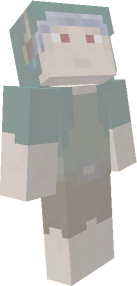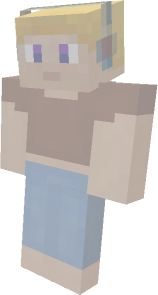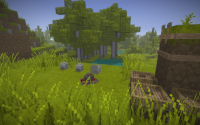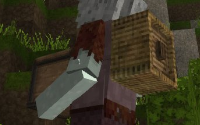Agency in Open Games
A whole two years have passed since my last post, huh? I don't even remember what all has happened in this time. Recently, I helped out a little with the indie game Vintage Story (such as refactoring mod loading), created my CarryCapacity mod for said game, and something I called "hyxel", a ray-traced, 4-dimensional game experiment.
I also started working on yet another game engine from scratch, but more on that when there's actually something worthwhile to show and talk about.
I figure I'm going to make things brief, and be open about that fact. I'm not particularly good at this whole blogging thing - I have a point to bring across! Let's start by outlining my experience with and opinions about different kinds of "open" games as I see them.
What "open" games do we have today?
- Open World games have a vast, finite world, most often crafted by a large team of developers to invoke a particular experience and / or tell a story while players can explore, often without feeling too limited or required to do certain tasks at any given time.

(The Elder Scrolls V: Skyrim, The Legend of Zelda™: Breath of the Wild and Elite: Dangerous, three games that came to mind when thinking of what "open world" means to me.)
-
Sandbox games are a "step up" in terms of freedom. They typically don't have a specific directive, end goal and story the player is meant to follow. Though gameplay is either designed a particular way, or is deliberately lacking, open, to allow for more creative freedom, like in Garry's Mod.
What I find particularly interesting with these is the emergent story telling potential they bring to the table. Procedural generation and random events interacting with each other and the player. Seeing places nobody else will see, build or create things nobody has before. These "stories" can naturally be shared with other players, friends, even with a video or streaming audience.

(Dwarf Fortress, Minecraft and ECO, games I actually have played - or at least tried to.)
-
Open Source games are yet another big step up, though obviously there will only be a handful of players who actually have the knowledge to start modifying the game they're playing.
There's a huge potential for more freedom that players might otherwise only obtain from games with a flourishing modding community.

(Terasology, Cataclysm: Dark Days Ahead and OpenTTD.)
We need to give players AGENCY!
Agency is the capability for a being to act in an environment. It sounds like a great way to describe and discuss how much of an impact a player actually has on their game world. Especially when it comes to actions the developer didn't necessarily intend or at least ones that they have less control over.
For me, it started even before I looked for a "multiplayer Dwarf Fortress" and ended up finding Minecraft while it was still in its infancy. Ever since I got infected with this "need" for games to give me something to do that I can be proud of. The desire to create something that allows others to create, express themselves and experience has only grown as well.
Here's some notable examples in games today that bother me:
-
Most role-playing games lock players into specific classes or skills they can use, and require you to level and gear up just to fight monsters of similar relative strength and ability to your new, higher level.
-
MMORPGs and their quests in particular have this constant reminder that most of what you do ultimately is just a timesink. Thousands of players have done the same thing as you before and they will keep doing so. That NPC you just helped will have rats to kill in their basement for all eternity, as I like to say.
-
Even in Minecraft, which is a great, open-ended sandbox with a huge modding community, I rarely see mods working together to create a coherent experience. Instead, it appears that they're fighting for dominance by being increasingly overpowered and easier to use. Only few mods and modpacks seem to put the effort into making something special.
-
On top of that, progression in many games (particularly ones which took inspiration from Minecraft) is designed for a single player to move through. Everything is meant to be easily achievable on your own. Playing with others even seems to diminish the experience, especially when you add mods to the mix.

... I've played a lot of Minecraft over the years, okay?
What Agency could look like
Allow players to shape the world they're in!
-
Let them create their own buildings, roads, cities, equipment, tools, ... all of which may look unique. Give them meaning in context of the game.
-
Make it open source. Encourage users to become developers. Integrate content made by players and support forks with different goals. Share code and ideas, and iterate on them to make many unique, worthwhile experiences.
-
"Require" teamwork. Make the game interesting and complex enough that players with different interests can do different things, and actually learn something from it. Be it building, design, reflexes, leadership, knowledge of the ingame world, flora, fauna, materials, regions, ...
-
Avoid built-in tutorials, help, tooltips, ... Don't make things too easy. To this day I believe part of Minecraft's success was due to its lack of clarity, which caused people to talk about the game, work together to discover how everything is put together.
Both as a player and developer, I want more agency in games! Other than hopefully creating more fulfilling gaming experiences, we could also inspire and perhaps even teach people to reshape their human existance and environment in the real world!





